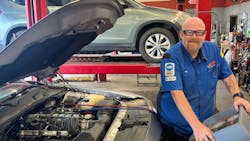Tire technician offers 'World Class' advice for repair professionals
The National Institute of Automotive Service Excellence (ASE) has recognized only 2,000 vehicle repair professionals as World Class Technicians, which means they earned ASE certification in 22 specialty areas, since the recognition program began 35 years ago. That's about 50 a year. Considering there are more than 800,000 auto and diesel techs in the U.S., a quarter-million of whom are ASE certified, it's quite an exclusive club.
And it's one that six technicians from New England-based VIP Tires & Service already belong to, with one more on the way. John Bemis, lead technician for the chain's Bangor, Maine location, has passed the 22 tests and gained the certifications needed to become a World Class Technician. He will officially be recognized next spring, according to ASE.
Modern Tire Dealer, a Fleet Maintenance affiliate, got a chance to speak with the 12-year industry veteran Bemis, who earned World Class status this year, in order to get a few insights on best practices for tire technicians. These ranged from leaning on more experienced techs, learning from your own mistakes, and effectively communicating with your team and the customer.
Learn from the more experienced technicians around you.
“The best practices are paying attention and learning—and learning comes from watching the guys who have been doing this for over 15 years,” Bemis said. “I did a two-year program for (technician training) and I got a degree in automotive, but I learned more in the first year in the field than I did in those two years at school."
Bemis noted that every moment in the shop, even when not actively working on a vehicle, provides an opportunity to improve your skills if you keep your eyes open.
He said “if you have downtime, pay attention to what the guys who have been here for forever are doing. That's how you’re going to learn.”
And once you start accruing more years of service and certifications, you should keep a watchful eye out for those who need your help. Bemis encouraged older technicians to take the initiative and teach younger technicians, too. He said he'll always invite younger technicians to watch him work on certain problems.
Communicate effectively within the shop.
“Whether it’s between the technician and the counter person, the technician and the customer, or a technician with another technician, without a good level of communication it makes everyone's jobs harder,” said Bemis.
Effective communication limits mistakes and confusion while helping the shop run more smoothly overall, he added.
Communication between technincians is particularly important.
Bemis says technicians sharing with one another what they worked on during the day and how they solved certain problems provides a great learning opportunity for others who will encounter similar problems later.
“I want them to encounter a problem and remember talking about it or watching a technician work on it 10 years ago at VIP Tires and using what they learned here to solve the problem,” he explained.
Mistakes happen. Use them.
“This is going to sound very blunt, but when you make a mistake, the best thing to do is to get over it,” he said. “When you’re new, you’re going to make mistakes. It’s the nature of the job to learn as you go. Move past the mistake and realize you are human. Now you know what not to do."
“We’ve all done it. I’ve had a wrench slip and break something unrelated to the job I’m doing and I’m like, ‘OK, looks like we are fixing that for free.’ It is what it is."
“If people read this and are new to the industry, my advice is to just keep plugging away," he concluded. "You’re going to make mistakes (and) you’re going to have hard issues and hard diagnoses. If this is what you want to do, it’s not going to be easy, but it’s going to be worth it."
A version of this article was originally published on ModernTireDealer.Com
About the Author
Madison Gehring
Associate Editor
Madison Gehring is Modern Tire Dealer's associate editor. A graduate of Ohio State University, Gehring holds a bachelor's degree in journalism. During her time at Ohio State, she wrote for the university's student-run newspaper, The Lantern, and interned at CityScene Media Group in Columbus, Ohio.
